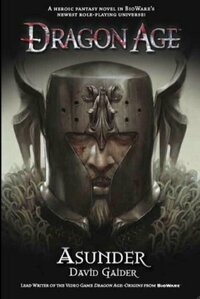Take a photo of a barcode or cover
adventurous
challenging
dark
emotional
funny
hopeful
mysterious
sad
tense
fast-paced
Plot or Character Driven:
A mix
Strong character development:
Yes
Loveable characters:
Yes
Diverse cast of characters:
No
Flaws of characters a main focus:
Yes
Picture this: I’m in my third, back-to-back playthrough of Dragon Age: Inquisition when I learn that my son, Cole, has a book that’s all about his backstory. Naturally, I had to find and read it as soon as possible.
While I’ve vaguely known that Dragon Age books existed, I hadn’t picked up any until now because, historically, books written to supplement a video game franchise are often lackluster comparatively. It can be hard to capture all the things that make a video game wondrous through text alone, without you there as the player character that makes all the decisions and ultimately saves the day. So imagine my delighted surprise when I read Asunder, only to find that I didn’t just like it; I devoured it.
Perhaps the book’s only major fault, which doesn’t apply to me, is that it’s not incredibly accessible to those who haven’t played the Dragon Age games. If you have, however, then it’s like falling back into the world of Thedas all over again. Asunder‘s primary setting is in the country of Orlais at the White Spire, which houses one of the many Circles of Magi. As this takes place after the Kirkwall rebellion, tensions between mages and templars have never been more taut, and now mysterious murders are taking place behind the Spire’s walls. When a mage named Rhys is pinned for the murders, he’ll do anything to clear his name, including venture out on a dangerous mission that will uncover knowledge that could change the fate of mages forever.
I’d heard Cole deliver his account of these events in DA:I, and luckily, it was a bare bones account because I was still surprised at many happenings that took place throughout Asunder. That is, of course, a testament to David Gaider’s writing, which balanced dialogue, character voice, description, plot, and pacing in a near-perfect fashion. The only minor flaw that I noticed were a couple of repetitive phrases like “sweat sliding down the face/brow” to indicate nervousness or strain. Aside from that, I loved how Gaider told this story and the regard he gave to every single character on the page, whether it was in their point of view or not.
This makes sense, given that Gaider was one of the lead writers of the games and is responsible for writing some of my favorite characters, such as Zevran, Morrigan, Fenris, and Alistair. Sometimes, this talent won’t translate to writing a full-blown novel, but this time, it did. All the new characters were wonderful to read, both as they all interacted with each other and as their own people: Ser Evangeline with her struggle of doing right yet performing her duty as a templar; Rhys with his sense of humor and compassion but his fears about his own fate along with that of his fellow mages; bold and brash Adrian; and the cold and harsh Lord Seeker Lambert. Returning characters were also a joy to experience, such as Leliana, Wynne, and Cole.
I really do have to single out Wynne for a moment. I felt like I had just gotten to know her in Dragon Age: Origins before the game was over, so having her as a major character in Asunder did wonders. (And, no, I haven’t played Dragon Age: Awakening yet, please forgive me.) Throwing her in a book with characters who all have strong opinions and personalities was also a great way to show off her own strengths and faults as well as how she’s changed since DA:O. I got incredibly emo about Wynne before it was all said and done.
Then, there’s Cole, my sweet boy, my shining star, my everything. He broke my heart and made me so proud, and that’s how you know he’s my Cole. Even though his dialogue is written slightly different in Asunder—closer to his more lucid moments than his alliterative, rambling ways in DA:I—I heard his voice come through loud and clear. And it made sense, in a way, given he did not fully realize his own nature in Asunder. Gaider played out Cole’s mystery, his tragedy, and his actualization beautifully. His character journey in Asunder transfers easily into DA:I, where he still has plenty of growing to do based on the decisions you help him make. Therefore, I couldn’t be happier with the justice Gaider did Cole’s character.
Even though the book only takes place in Orlais, the world-building is as rich and expansive as you would expect from Dragon Age. As you read, you experience the still rippling effects of the Kirkwall rebellion; witness politics and posturing in Val Royeaux and the Grand Cathedral; and watch the beginnings of the Orlesian Civil War unfold between Empress Celene and her cousin, Grand Duke Gaspard.
While the swells of history surround our characters, the mage/templar conflict rests firmly in the center of it all, the eye of our storm. Every scene in the White Spire mounts with tension and danger, tempers threatening to spill over on both sides even as compromises and peace attempt to be made—both ultimately dissatisfying to all parties. The distrust and wrongs committed by both sides are just too great a chasm to fill, and no matter what, you know something is about to take place. I felt like I was hovering upon a knife’s edge, waiting for the bloodshed to start, for one action to be taken too far, too personally.
Even if you feel strongly one way or the other about this conflict (pro-mage, always), the book takes great pains to show that every mage, templar, and Seeker of Truth has valid reasons and viewpoints for seeing the world and this specific plight as they do. It was impressive how well Gaider maintained that this conflict isn’t a black-and-white situation while also showing the truth of it in the self-awareness and actions of the characters, even when they were being their most unreasonable. For being as harsh and unforgiving as he is, even Lord Seeker Lambert demonstrates moments of thoughtfulness as well as insight, and I am surprised that I can admit that. That he wasn’t just a two-dimensional bastard villain.
It’s amazing what can be accomplished, how much depth even a little mass market paperback can have, when you write with nuance.
So yes, I loved this book and all the beautiful things it did, all the character moments and plot reveals with the lore woven expertly throughout. Whether you’ve already played DA:I or not, I cannot recommend Asunder any higher. Well done, Gaider!
Asunder is objectively the best of Gaider's three and I'd consider it required reading before playing Inquisition, as it provides context to the mage rebellion and introduces several crucial characters. This book is enjoyable and true to the spirit of of the Dragon Age universe, but there are still a few things that bother me, though my opinions here are little more nitpicky than the ones I had for books 1 and 2.
-I like Cole in this book. For Inquisition, Patrick Weekes took Cole and made him one of the best-written characters in all the Dragon Age series. I know this isn't Gaider's fault, but I just wish Book Cole and Game Cole melded a little more seamlessly.
-I wish Adrian had been developed more, or a more interesting character had been written in her place. She just doesn't feel like a real person to me.
-Keeping with the trend, the romance that develops feels forced. Rhys and Evangeline don't have much one-on-one interaction and no apparent chemistry, so when they kiss it's just, meh.
-Perhaps my biggest gripe, Wynne's fate and what she says beforehand don't make sense to me. She doesn't really know Evangeline and saving her didn't anything for the plot in that moment, so it comes across as kind of... meaningless? If it was her own SON she was saving, maybe it would have been more impactful.
The end ~ If you're a DA fan, this one is a Highly Recommend.
-I like Cole in this book. For Inquisition, Patrick Weekes took Cole and made him one of the best-written characters in all the Dragon Age series. I know this isn't Gaider's fault, but I just wish Book Cole and Game Cole melded a little more seamlessly.
-I wish Adrian had been developed more, or a more interesting character had been written in her place. She just doesn't feel like a real person to me.
-Keeping with the trend, the romance that develops feels forced. Rhys and Evangeline don't have much one-on-one interaction and no apparent chemistry, so when they kiss it's just, meh.
-Perhaps my biggest gripe, Wynne's fate and what she says beforehand don't make sense to me. She doesn't really know Evangeline and saving her didn't anything for the plot in that moment, so it comes across as kind of... meaningless? If it was her own SON she was saving, maybe it would have been more impactful.
The end ~ If you're a DA fan, this one is a Highly Recommend.
adventurous
dark
emotional
funny
mysterious
tense
medium-paced
Strong character development:
Yes
Loveable characters:
Yes
Diverse cast of characters:
Yes
Flaws of characters a main focus:
Yes
Such a great story! BioWare writers do such an amazing job nodding at fans with these stories, giving us another adventure with Wynne. Cole is such a cool character and having this introduction helps flesh him out so much more in Inquisition! This is closely tied for my favourite in the series losing only to The Masked Empire because I find Celene and Orlesian politics/The Game intriguing.
Not gonna lie, it was nice to not read about the freaking Deep Roads for once.
adventurous
dark
slow-paced
Strong character development:
Complicated
Loveable characters:
Complicated
Diverse cast of characters:
Yes
This is, so far, my favorite book in the Dragon Age series. While a good portion of that could be attributed to my obsession with the dear, precious character Cole, I do think the flow of the story has improved through the series.
This book is technically a prequel to the game Dragon Age: Inquisition, and although the tie-ins are a bit stretched and not frequently referenced, it does give one a better understanding of the mage rebellion, and a bit of sympathy for both sides of it, as it not only emphasized the plight of the mages, but also even a little bit of the struggle of the templars involving lyrium addiction. On top of that, it also involves some involvement from characters in Origins, although oddly skips over anything from Dragon Age 2. Still, the cameos are welcome and interesting.
I found that the book enriched my enjoyment of Inquisition, endearing me to Cole and making me feel more invested in the mage-templar conflict, as well as introducing the characters of Rhys and Evangeline, who earn a small mention in the game too. So give it a try if you're into the games!
This book is technically a prequel to the game Dragon Age: Inquisition, and although the tie-ins are a bit stretched and not frequently referenced, it does give one a better understanding of the mage rebellion, and a bit of sympathy for both sides of it, as it not only emphasized the plight of the mages, but also even a little bit of the struggle of the templars involving lyrium addiction. On top of that, it also involves some involvement from characters in Origins, although oddly skips over anything from Dragon Age 2. Still, the cameos are welcome and interesting.
I found that the book enriched my enjoyment of Inquisition, endearing me to Cole and making me feel more invested in the mage-templar conflict, as well as introducing the characters of Rhys and Evangeline, who earn a small mention in the game too. So give it a try if you're into the games!
This is the first, and will probably be the only, Dragon Age tie-in novel I have read. I thought I'd give it a go because a) Gaider is an exceptionally good writer of characters (for those readers who don't play story-based video games, yes video games have characters, and plots, and stuff. And they have around 60 hours of screentime to play with to do it); and b) rumour was it had important background info to bridge the gap between Dragon Age 2 and 3.
Both were valid enough. The characters are solid, intriguing and rounded. I could tell that because I started really hoping that the characters would prominently appear as NPCs in the next game (they;d be great companions). The book certainly does describe events that give you a pretty good idea where the next game will pick up. I didn't really hate it.
But it felt a bit like describing a video game in places - lots of detail about the fighting, for example. And why did people keep setting off in expeditions in small groups, to explore defined areas and have a few fights along the way? It felt at times like the novel was bound by the conventions of the RPG game genre, almost complete with levelling up moments.
Both were valid enough. The characters are solid, intriguing and rounded. I could tell that because I started really hoping that the characters would prominently appear as NPCs in the next game (they;d be great companions). The book certainly does describe events that give you a pretty good idea where the next game will pick up. I didn't really hate it.
But it felt a bit like describing a video game in places - lots of detail about the fighting, for example. And why did people keep setting off in expeditions in small groups, to explore defined areas and have a few fights along the way? It felt at times like the novel was bound by the conventions of the RPG game genre, almost complete with levelling up moments.
David Gaider's Asunder is set, for the most part, in Val Royeaux: capital of Orlais, home to the Grand Cathedral, the centre of the Andrastian faith in southern Thedas, and also to the White Spire, the tower that houses the Orlesian Circle of Magi. The promise of tension implicit in the setting is well fulfilled—there's plenty of strife between these covers.
Asunder is all about the conflict between mages and the Chantry across Thedas following the events of Dragon Age 2. Opinionated as I am about the topic of mage rights, I fell headfirst into this story and savoured every moment. There's some cracking moments in here too. While The Calling often stumbled, Asunder felt like Gaider finding his stride.
Asunder is all about the conflict between mages and the Chantry across Thedas following the events of Dragon Age 2. Opinionated as I am about the topic of mage rights, I fell headfirst into this story and savoured every moment. There's some cracking moments in here too. While The Calling often stumbled, Asunder felt like Gaider finding his stride.
I may be a little biased in my rating because I adore the Dragon Age games and this was the perfect way to fill the void of not knowing what comes next, plus it included two of my favorite characters from Dragon Age: Origins and that is pretty much a guaranteed way to get me to fall in love with something...
Also, I was pleased to see the progress Gaider has made as a novel writer. The pacing and plotting were much improved from his first two books.
Overall, definitely for fans of the series as some bits here and there would likely seem confusing to new readers.
Also, I was pleased to see the progress Gaider has made as a novel writer. The pacing and plotting were much improved from his first two books.
Overall, definitely for fans of the series as some bits here and there would likely seem confusing to new readers.






